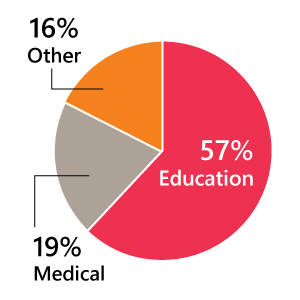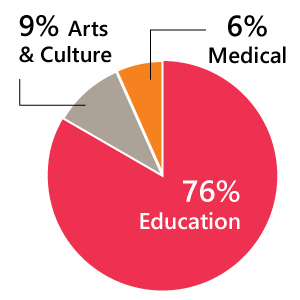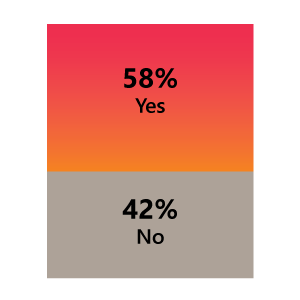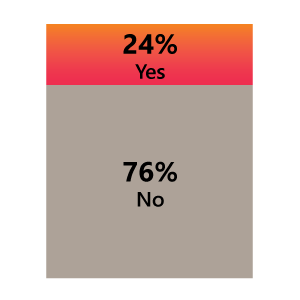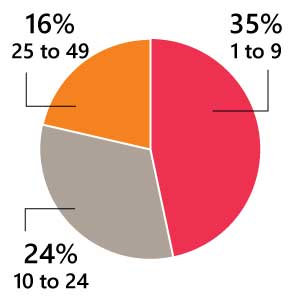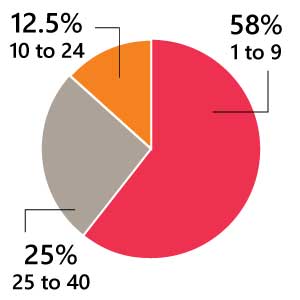Last year, BWF teamed up with PyroTalks CIC to launch a sector-first Due Diligence Survey.
The focus was to gather insight into the due diligence process along with the ethics and reputational risk in philanthropy, with an initial focus on the UK & Europe. This was later extended to include Australia thanks to a partnership with Apra Australia. The differences in findings have been summarized below to provide a useful perspective on international approaches to due diligence.
Key Similarities
- The majority (75%-80%) of UK & Europe and Australia respondents cite ‘1 or less’ FTE staff dedicated to due diligence.
- Around 50% of both UK & Europe and Australia respondents have a formal Gift/Donation Acceptance Committee.
- On whether philanthropy departments take due diligence seriously or are able to handle a ‘PR crisis’, all respondents answered similarly, with around 50% feeling Confident or Very Confident.
- Lead signatories for different donation levels largely remained the same, as did the volume of reports completed per year, the time they took to complete, and the risks they touched on.
- UK & Europe and Australia respondents answered similarly when asked to define whether or not they had a dedicated budget for due diligence, i.e. a large portion had no specific budget and where they did, it was the same amount, cited at 0-999 (£/$).
- Consequently, the majority of respondents felt that due diligence was underfunded by their department.
Key Differences
- Most UK & Europe teams start their major gift definition at £25,000+/AUD $47,500, whereas Australia starts at £5,000/AUD $10,000.
- When it came to confidence that due diligence processes are sufficient to protect their organization’s reputation, 65% of UK & Europe teams felt Confident or Very Confident, whereas only 33% of Australia respondents felt the same.
- UK & Europe respondents were able to offer a clear view on where their lowest or highest due diligence activation levels started, whereas almost half of Australia respondents could not.
- UK & Europe respondents were significantly more likely to count cumulative donation totals as part of their due diligence activation levels than respondents from Australia.
- When it came to the official ‘makeup’ of Gift/Donation Acceptance Committees, UK & Europe saw a more nuanced board composition. They had a much higher representation of specialist perspectives, i.e. Media Relations and Neutral Members.
In summary, UK & Europe and Australia responses are similar in a number of key, practical areas, yet respondents all shared a general lack of confidence in their departments’ ability to handle due diligence issues and believe the process is underfunded.
Generally, it could be said that these results show that the UK & Europe is ‘slightly ahead’ in deploying their due diligence process. For example, UK & Europe respondents were able to conclusively provide formal due diligence activation levels, count cumulative donations, and show a more nuanced composition of staff assigned to Gift/Donation Acceptance Committees.
| UK & Europe | Australia |
|---|---|
| Respondents by sector–Top 3 | Respondents by sector–Top 3 |
How many FTE staff are dedicated to due diligence? Top Answer
|
How many FTE staff are dedicated to due diligence? Top Answer
|
What level is considered a major gift in your fundraising department? Top Answer
|
What level is considered a major gift in your fundraising department? Top Answer
|
How serious do you think due diligence is taken at your organization? Top Answer
|
How serious do you think due diligence is taken at your organization? Top Answer
|
If a PR crisis were to occur, are you confident your department would know what steps to take? Top Answer
|
If a PR crisis were to occur, are you confident your department would know what steps to take? Top Answer
|
How confident are you that your due diligence process is sufficient to protect your organisation’s reputation? Top Answer
|
How confident are you that your due diligence process is sufficient to protect your organisation’s reputation? Top Answer
|
In your standard process, what is the gift/solicitation amount at which your lowest due diligence process is activated? Top Answer
|
In your standard process, what is the gift/solicitation amount at which your lowest due diligence process is activated? Top Answer
Note: ‘Other’ included a mixture of ‘it depends’ comments, citing lower levels than the survey options provided, or the absence of a lower threshold altogether. |
Lead authorising signature for whether the gift is accepted at lowest gift level is:
|
Lead authorising signature for whether the gift is accepted at lowest gift level is:
|
In your standard process, what is the highest gift/solicitation amount at which your due diligence level is activated? Top Answer
|
In your standard process, what is the highest gift/solicitation amount at which your due diligence level is activated? Top Answer
Note: ‘Other’ included a mixture of ‘it depends’ comments, citing higher levels than the survey options provided, or the absence of a higher threshold altogether. |
Who is the lead (or principal) authorising signature for whether the gift is accepted at the highest gift level? This signatory can also be the chair of a due diligence/gift acceptance committee. Top Answer
|
Who is the lead (or principal) authorising signature for whether the gift is accepted at the highest gift level? This signatory can also be the chair of a due diligence/gift acceptance committee. Top Answer
|
| Do your thresholds take into account cumulative totals? | Do your thresholds take into account cumulative totals? |
In general, at what stage in the relationship is your due diligence triggered? Top 3
|
In general, at what stage in the relationship is your due diligence triggered? Top 3
|
Do you conduct due diligence on non-prospects/donors?
|
Do you conduct due diligence on non-prospects/donors?
|
Do you have a due diligence gift acceptance committee?
|
Do you have a due diligence gift acceptance committee?
|
Who is on the due diligence/gift acceptance committee? (Of those who said ‘Yes’ to having a gift acceptance committee.)
|
Who is on the due diligence/gift acceptance committee? (Of those who said ‘Yes’ to having a gift acceptance committee.)
|
Please rank by level of importance the top 3 main risk factors you are looking for.
|
Please rank by level of importance the top 3 main risk factors you are looking for.
|
| Number of due diligence reports completed per year–Top 3 | Number of due diligence reports completed per year–Top 3 |
How long does a report take?
|
How long does a report take?
|
What is your (non-staff) budget for due diligence specifically?
|
What is your (non-staff) budget for due diligence specifically?
|
How well do you feel the due diligence team is funded compared to other teams in your fundraising department? Top Answer.
|
How well do you feel the due diligence team is funded compared to other teams in your fundraising department? Top Answer.
|
Have you or any member of your team ever received training on due diligence, ethics, and/or reputational risk? Top Answer.
|
Have you or any member of your team ever received training on due diligence, ethics, and/or reputational risk? Top Answer.
|

